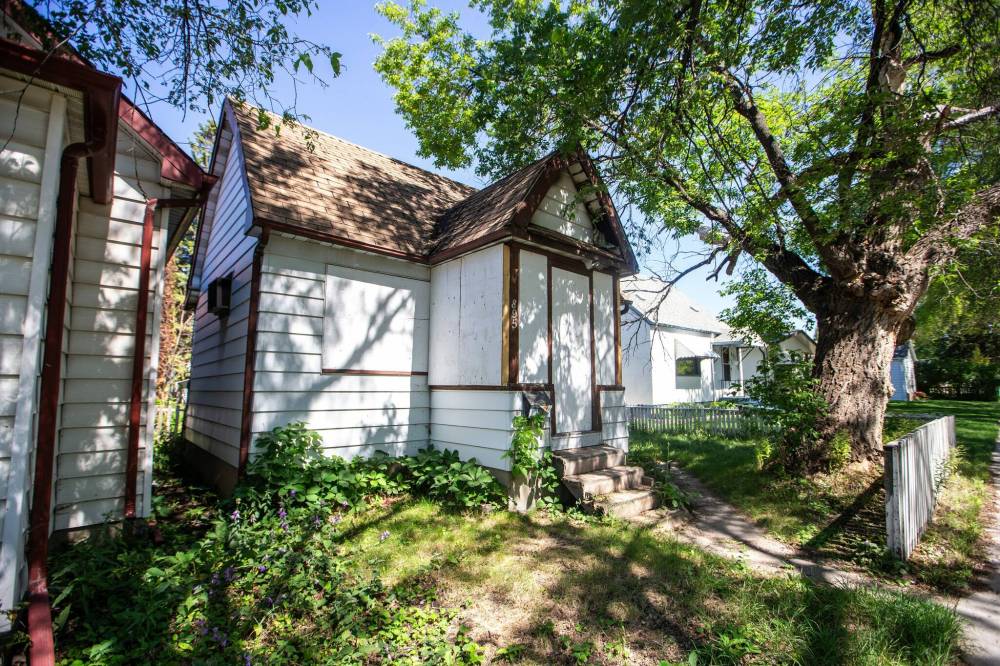A Winnipeg city councillor said she wants city hall to be more aggressive with owners of vacant, derelict buildings and plans to throw the book at those who fail to restore their properties.
However, before the city looks at new ways of cracking down on the owners of those eyesores, it should explain why it has stopped using a legal mechanism it’s had for more than 20 years that allows it to seize some of those properties.
Coun. Sherri Rollins, who chairs the city’s property and development committee, said earlier this week it’s time to tighten the screws on those who allow their properties to sit vacant and boarded up for extended periods of time.

MIKAELA MACKENZIE / FREE PRESS FILES
A derelict house on Lorette Avenue in Rockwood sits abandoned and boarded up in 2023. A Winnipeg city councillor said she wants city hall to be more aggressive with owners of vacant, derelict buildings.
“We are seeing too much dereliction and we’re seeing too much vacancy,” said Rollins following a verbal report to the committee from a task force looking at ways to combat the growing scourge of abandoned properties. “So if you’re holding on to a derelict and vacant building, this is the wake-up call … If you don’t heed the wake-up call there, there (are) tougher policy moves on the horizon.”
Those may sound like fighting words but city council has largely turned a blind eye to the hundreds of derelict properties around Winnipeg that have sat vacant for years. In many cases, their owners have made no effort to restore their properties and continue to allow their buildings to deteriorate.
Rollins has directed the public service to report back to the committee about proposed provincial legislation that would allow the city to demolish vacant and derelict buildings when they pose a fire hazard. That’s fine. But the city already has a legal mechanism to seize vacant properties when their owners refuse to properly maintain them. Trouble is, it hasn’t been used since 2016.
The city has taken a few minor steps in recent years to combat the vacant building problem, including billing owners for the cost of fighting fires on their properties. The city also charges owners an empty building fee and a boarded up building fee.
Unfortunately, that hasn’t been enough to convince many to restore their properties, or to sell them to someone who will. Instead, the buildings sit vacant for years and deteriorate over time. They are a blight on neighbourhoods, they reduce the value of nearby properties, and they pose fire and other hazards.
Those owners have a right to own private property. But they also have a responsibility to maintain their buildings. They should lose their property rights if they refuse to keep their buildings in good repair and if they allow them to sit vacant for prolonged periods.
The city can seize those properties through a process called “take title without compensation.” City hall has seized 16 properties through that mechanism between 2010 and 2016.
It’s an onerous process, as it should be. It can only begin if the owner is convicted under the city’s vacant building bylaw. A conviction may include an owner failing to take steps to properly secure their building or to keep it in good repair. The city gives owners several opportunities to comply with upkeep orders. If they refuse, they can be charged and convicted in provincial court. When that happens, the city can then begin the process of taking title of the property without compensating the owner for it.
So why doesn’t city hall use that mechanism more often? And why has it not been used since 2016?
I asked the city that question but did not get a satisfactory answer.
“We’re looking into the background of transactions completed 10-15 years ago,” a city spokesperson said in an email. “And the landscape of vacant building enforcement has changed over that time.”
The public deserves a better explanation than that.
There is no shortage of derelict properties that are not in compliance with the vacant building bylaw that could be charged and probably convicted. That would allow the city to start the process of seizing at least some of those properties.
If Rollins and other councillors are serious about wanting to crack down on irresponsible property owners, they should demand to know from administration why this avenue has not been pursued since 2016. There are clear examples of successful property seizures under this process. It’s time for the city to start using it again.
tom.brodbeck@freepress.mb.ca

Tom Brodbeck
Columnist
Tom Brodbeck is a columnist with the Free Press and has over 30 years experience in print media. He joined the Free Press in 2019. Born and raised in Montreal, Tom graduated from the University of Manitoba in 1993 with a Bachelor of Arts degree in economics and commerce. Read more about Tom.
Tom provides commentary and analysis on political and related issues at the municipal, provincial and federal level. His columns are built on research and coverage of local events. The Free Press’s editing team reviews Tom’s columns before they are posted online or published in print – part of the Free Press’s tradition, since 1872, of producing reliable independent journalism. Read more about Free Press’s history and mandate, and learn how our newsroom operates.
Our newsroom depends on a growing audience of readers to power our journalism. If you are not a paid reader, please consider becoming a subscriber.
Our newsroom depends on its audience of readers to power our journalism. Thank you for your support.